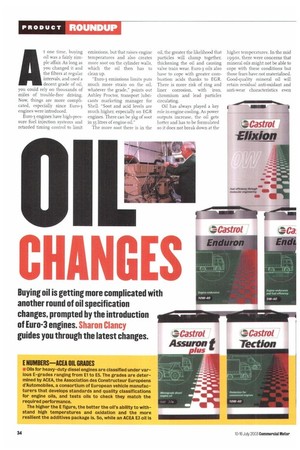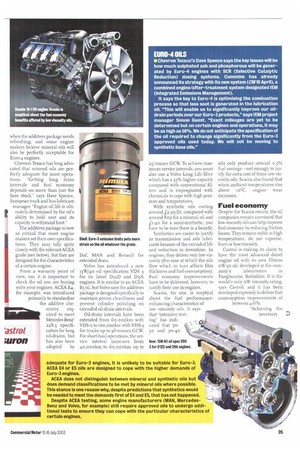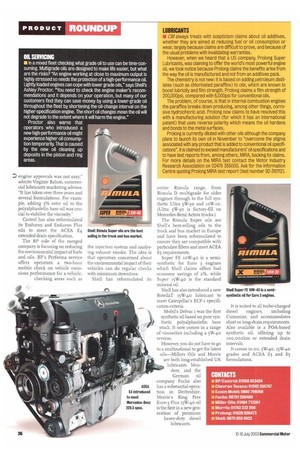CHANGES
Page 34

Page 35

Page 36

If you've noticed an error in this article please click here to report it so we can fix it.
Buying oil is getting more complicated with another round of oil specification changes, prompted by the introduction of Euro-3 engines. Sharon Clancy guides you through the latest changes.
At one time, buying oil was a fairly simple affair. As long as you changed it and the filters at regular intervals, and used a decent grade of oil, you could rely on thousands of miles of trouble-free driving. Now, things are more complicated, especially since Euro-3 engines were introduced.
Euro-3 engines have high-pressure fuel injection systems and retarded timing control to limit emissions, but that raises engine temperatures and also creates more soot on the cylinder walls, which the oil then has to clean up.
"Euro-3 emissions limits puts much more strain on the oil, whatever the grade," points out Ashley Proctor, transport lubricants marketing manager for Shell. "Soot and acid levels are much higher, especially on EGR engines. There can be 3kg of soot in 35 litres of engine oil."
The more soot there is in the oil, the greater the likelihood that particles will clump together, thickening the oil and causing valve train wear. Euro-3 oils also have to cope with greater combustion acids thanks to EG R. There is more risk of ring and liner corrosion, with iron, chromium and lead particles circulating.
Oil has always played a key role in engine cooling. As power outputs increase, the oil gets hotter and has to be formulated so it does not break down at the higher temperatures. In the mid 19905, there were concerns that mineral oils might not be able to cope with these conditions but those fears have not materialised. Good-quality mineral oil will retain residual anti-oxidant and anti-wear characteristics even when the additives package needs refreshing, and some engine makers believe mineral oils will also be perfectly acceptable for Euro-4 engines.
Chevron Texaco has long advocated that mineral oils are perfectly adequate for most operations. "Getting long drain intervals and fuel economy depends on more than just the base stock," says Dave Spence, European truck and bus lubricant manager. "Engine oil life is ulti mately determined by the oil's ability to hold soot and its capacity to withstand heat."
The additives package is now so critical that most engine makers set their own specifications. They may tally quite closely with the relevant ACEA grade (see below), but they are designed for the characteristics of a certain engine.
From a warranty point of view, too, it is important to check the oil you are buying suits your engines. ACEA E4, for example, was introduced primarily to standardise the additive che
mistry required to meet Mercedes-Benz' 228.5 specification for long oil-drains, but has also been adopted by Daf, MAN and Renault for extended drain.
Volvo has introduced a new 15W/40 oil specification VDS 3 for its latest Di2D and D9A engines. It is similar to an ACEA E5 oil, but Volvo says the additives package is designed specifically to maintain piston cleanliness and prevent cylinder polishing on extended oil-drain intervals.
Oil-drain intervals have been extended from 60,o ookm with VDS-2 to too.000km with VDS-3 for trucks up to 36-tonnes GCW. For short-haul operations, the service interval increases from 4o,000lcm to 6o,000km up to
29 tonnes GCW. To achieve maximum service intervals, you must also use a Volvo Long Life filter which has a 33% higher capacity compared with conventional filters and is impregnated with chemicals to cope with high pressure and temperatures.
With synthetic oils costing around £2,5o/lit, compared with around 8op for a mineral oil and £1.40 for a semi-synthetic, you have to be sure there is a benefit.
Synthetics are easier to justify as transmission and axle lubricants because of the extended life and reduction in downtime. In engines, they deliver very low viscosity (the ease at which the oils flow which in turn affects film thickness and fuel consumption). Fuel economy improvements have to be delivered, however, to justify their use in engines.
Scania, for one, is sceptical about the fuel performanceenhancing characteristics of
low viscosity oils. It says that "extensive test ing" has indicated that 5w 30 and 5w-40
oils only produce around 0.5% fuel savings—not enough to justify the extra cost of these low viscosity oils. Scania also found that when ambient temperatures rise above io°C, engine wear increases.
Fuel economy
Despite the Scania results, the oil companies remain convinced that low-viscosity oils can help improve fuel economy by reducing friction losses. They remain stable at high temperatures, do not vaporise, burn or lose viscosity.
Castrol is staking its claim to have the most advanced diesel engine oil with its new Elixion oW-3 o oil, developed at the corn pany's laboratories in Pangbourne, Berkshire. It is the world's only oW viscosity rating, says Castrol, and it has been developed expressly to deliver fuel consumption improvements of between 4-6%.
"Achieving the necessary
n engine approvals was not easy," admits Virginie Bahon, commercial lubricants marketing advisor. "It has taken over three years and several formulations. For example, adding 5% ester oil to the polyalphaolefin base oil was crucial to stabilise the viscosity."
Castro] has also reformulated its Enduron and Enduron Plus oils to meet the ACEA E4 extended drain specification.
The BP side of the merged company is focusing on reducing the environmental impact of fuels and oils. BP's Perforrna service offers operators a two-hour mobile check on vehicle emissions performance for a vehicle,
checking areas such as the injection system and analysing exhaust smoke. The idea is that operators concerned about the environmental impact of their vehicles can do regular checks with minimum downtime.
Shell has reformulated its
entire Rimula range, from Rimula D multigrade for older engines through to the full synthetic Ultra 5W-3o and roW-io. (Ultra 5W-30 is factory-fill on Mercedes-Benz Actros trucks.)
The Rimula Super oils are Shell's best-selling oils to the truck and bus market in Europe and have been reformulated to ensure they are compatible with particulate filters and meet ACEA E5 requirements.
Super FE roW-4o is a semisynthetic for Euro 3 engines which Shell claims offers fuel economy savings of 2%, while Super 15W-4o is the standard mineral oil.
Shell has also introduced a new RotellaT 15W-4o lubricant to meet Caterpillar's ECF-r specification criteria.
Mobil's Delvac a was the first synthetic oil based on pure synthetic polyalphaolefin base stock. It now comes in a range of viscosities including a 5W-4o version.
However, you do not have to go to a multinational to get the latest oils—Millers Oils and Morris are both long-established UK lubricants blenders, and the German oil company Fuchs also has a substantial operation in Derbyshire. Morris's Ring Free Euro-3 Plus 15W-40 oil is the first in a new generation of premium heavy-duty diesel lubricants. It is suited to all turbo-charged diesel engines, including Cummins, and accommodates short or long-drain requirements. Also available is a POA-based synthetic oil, offering up to roo,000kin or extended drain intervals.
It comes in no, 5W-4o, 15W-4o grades and ACEA E3 and E5 formulations.




































































































































































